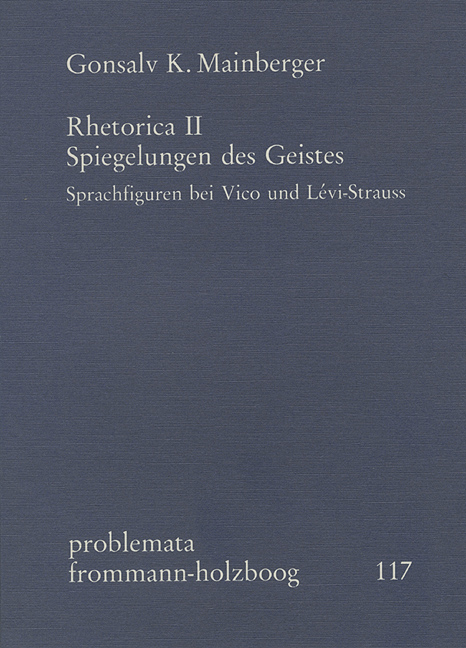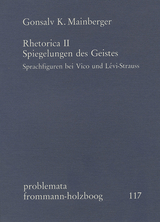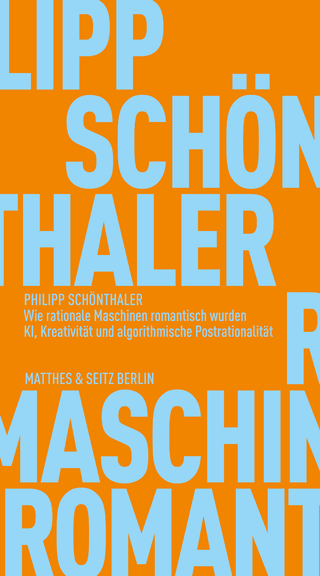Rhetorica II: Spiegelungen des Geistes. Sprachfiguren bei Vico und Lévi-Strauss
Seiten
1988
Frommann-Holzboog (Verlag)
978-3-7728-0939-2 (ISBN)
Frommann-Holzboog (Verlag)
978-3-7728-0939-2 (ISBN)
Rhetoric once had a kingly position. Deposed and transformed, it is effective today under changed conditions and other names. A barely discovered, yet productive ferment of postmodernism is the rhetorical use of reason. This thesis is one of the motives of reasearch fo Rhetorica II, which follows up on Rhetorica I with a re-reading of Aristotle, Quintilian and Augustine. Two rhetorically conceived models of the conjectural use of reason are brought to light in theis epistemic-historical study: Vico's Metaphysics and Lévi-Strauss' Mythologica. Both prove to be guiding references in finding answers – based on principles that are, however, not of scientific-dogmatic nature – to those questions asked by reason, which are dependent on conjecture and combination, disentanglement and relation, and communication and emotion.With reference to Vico, rhetoric was already a driving force in the change of paradigm from the rationally directed metaphysics of the ideal world to the rhetorically conceived criticism of reason as a reconstruction of the mondo civile. rhetorica II shows that Lévi-Strauss abides by Vico's productive concept of reason and understands the myth to be a spiritual product of rhetorical origin. This approach makes it possible to enter wild thinking into the history of reason. Through Rhetorica II, conjectural rationality regains its place in the universe of knowledge. The book invites philosophers to take a new look at rhetoric and outlines o philosophy of finiteness. It advises us to strengthen the competence of reason regarding contingency in order to deal with the threats of the present age. ›Rhetorica II‹ stellt sich dem Faktum, dass die Rhetorik heutzutage vor allem in der Suggestion, die von technischen Apparaten ausgeht, allgegenwärtig ist. Um das Profil dieses Typus von Rationalität herauszuarbeiten, biegt die Studie in den Weg von Vico ein, in einen der ersten Zugänge zum mondo civile, d.h. zum Nicht-Notwendigen im Modus der Geschichte. Treibende Kraft zu dieser Welterklärung ist die vermutende Vernunft.
Gonsalv K. Mainberger, geboren 1924, scholastisch ausgebildeter Theologe, unterrichtete Philosophie im ehemaligen Belgisch-Kongo und in Belgien; später als Gastdozent an verschiedenen deutschen und schweizerischen Hochschulen und als Lehrer an der Kantonsschule Zug. Er lebt in Zürich.
| Reihe/Serie | problemata ; 117 |
|---|---|
| Verlagsort | Stuttgart-Bad Cannstatt |
| Sprache | deutsch |
| Maße | 148 x 205 mm |
| Gewicht | 430 g |
| Einbandart | Paperback |
| Themenwelt | Geisteswissenschaften ► Philosophie ► Sprachphilosophie |
| Geisteswissenschaften ► Sprach- / Literaturwissenschaft ► Sprachwissenschaft | |
| Schlagworte | 19. Jahrhundert • 20. Jahrhundert • Lévi-Strauss • Lévi-Strauss, Claude • Philosophie • Rhetorik • Sprachfiguren • Sprachphilosophie • Sprach- und Literaturwissenschaften • Vico • Vico, Giovanni B. (Giambattista) |
| ISBN-10 | 3-7728-0939-1 / 3772809391 |
| ISBN-13 | 978-3-7728-0939-2 / 9783772809392 |
| Zustand | Neuware |
| Haben Sie eine Frage zum Produkt? |
Mehr entdecken
aus dem Bereich
aus dem Bereich
Macht und Legitimität politischer Sprache im Prozess der europäischen …
Buch | Softcover (2023)
Nomos (Verlag)
74,00 €
KI, Kreativität und algorithmische Postrationalität
Buch | Softcover (2024)
Matthes & Seitz Berlin (Verlag)
16,00 €
Wie die Menschheit zu ihrer größten Erfindung kam
Buch | Softcover (2022)
C.H.Beck (Verlag)
18,00 €




